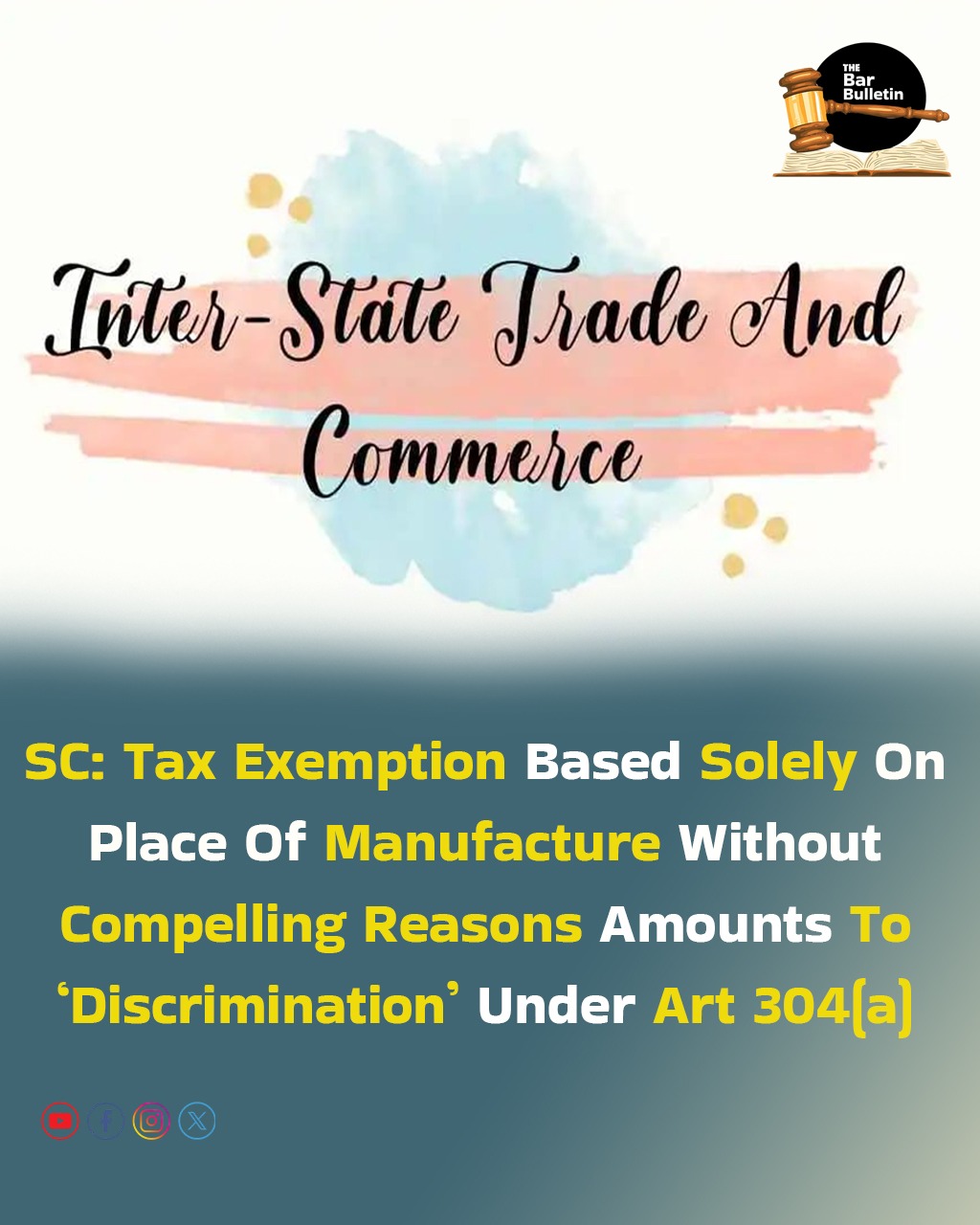While striking down Notification No. S.O.377, dated March 09, 2007, issued by the Government of Rajasthan, which granted VAT exemption to local asbestos sheet manufacturers while imposing full VAT on sheets imported outside Rajasthan, the Supreme Court ruled that tax exemption based solely on the place of manufacture, without clear and compelling justification, amounts to “discrimination” under Article 304(a) of the Constitution of India.
The Two-Judge Bench comprising Justice BV Nagarathna and Justice KV Viswanathan observed that there cannot be tax barriers or fiscal barriers in the interest of free trade, commerce, and intercourse throughout the territory of India, guaranteed by Article 301 of the Constitution. The Bench essentially emphasized that the States cannot discriminate between goods manufactured within their territory and those brought in from other states for the purpose of sale.
The Bench clarified that the Notification issued by the State of Rajasthan reflected a hostile, protectionist attitude toward sheets imported from outside the state, and it lacked valid justification, such as a genuine link to the use of 25% Rajasthan-sourced fly ash; and it extended benefits not to a specific class for a limited duration but indiscriminately for many years.
The Bench observed that States are at liberty to design their fiscal legislation in such a manner to ensure that the tax burden on goods imported from other States is equal to the tax burden on those goods produced within the State. Under Article 304(a) of the Constitution, a State Legislature may tax goods imported from other States or Union Territories, but in the process shall not discriminate against them vis-à-vis goods manufactured locally.
Speaking for the Bench, Justice Nagarathna observed that if a legislation discriminates against a class of persons against others similarly situated, and denies to the former the privileges that are enjoyed by the latter, the same would be regarded as “hostile” in the sense that it affects injuriously the interests of that person or class. Accordingly, the Bench declared the notification to be violative of Article 304(a) of the Constitution as it directly discriminates against the outside of Rajasthan-based manufacturers, whose asbestos sheets also contained 25% or more fly ash equivalent to fly ash used by the Rajasthan-based manufacturers.
Briefly, in this case, the appellants engaged in the business of manufacturing and selling fly ash-based asbestos cement products, had no manufacturing units in the State of Rajasthan, but had their sales depots in the State. Initially, the State of Rajasthan issued a notification dated January 24, 2000, in the form of an exemption from sales tax, to encourage industries of asbestos cement sheets and bricks manufactured in the State by an industrial unit having fly ash as its main raw material. However, when the Rajasthan Value Added Tax Act, 2003 came into operation from April 01, 2006, the State of Rajasthan issued a Notification No. S.O.377, dated March 09, 2007, which granted VAT exemption to local asbestos sheet manufacturers while imposing full VAT on sheets imported outside Rajasthan.
The appellant challenged the Notification before the Rajasthan High Court, but the same was dismissed, opining that the decision on the question whether there has been discrimination between the imported and the local goods depends on diverse factors. The High Court opined that where there is no intentional discrimination but the concession from sales tax is given in respect of goods manufactured in a particular State which is not so developed, in furtherance of economic development and where such concession is granted to new industries for a specific time which came into existence for a specific period, such concession or exemption may not offend Part XIII of the Constitution of India.
Appearances:
Senior Advocates Kavita Jha &Nikhil Goel, AORs Siddhartha Chowdhury & Ashutosh Ghade, along with Advocates Shammi Kapoor, SwatiAgarwal, Shaffi Mather, Riddhi Jain, Saloni Meshram, and Adithya Koshy Roy, for the Appellant/ Taxpayer
Senior Advocate Dr. Manish Singhvi, AORs Milind Kumar, Nidhi Jaswal & Punit Dutt Tyagi, along with Advocates Apurv Singhvi and Shalini Haldar, for the Respondent/ Revenue

